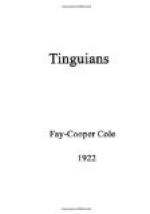When the recital is finished, the fowl is killed, and its blood mixed with rice is placed in nine dishes and one polished coconut shell. From these it is transferred to nine other dishes and one bamboo basket. These are placed in a row, and nine dishes and one unpolished shell are filled with water, and placed opposite. In the center of this double line is a dish, containing the cooked flesh of the rooster, also some rice, and one hundred fathoms of thread, while between the dishes are laid ten half betel-nuts, prepared for chewing. Later, all these things are returned to a single receptacle, except those in the shell cups and basket, which are placed in the spirit-house. The underlying idea in this procedure seems to be that frequently found in other ceremonies, namely, that food and water symbolizes the life of the patient, which is partially taken away by the spirits; but when they are returned to one place, the life must be replaced in a like manner.
In Manabo a piece of banana bark is taken from one of the plantings beside a bawi; and, after being washed in the water, is applied to the affected limb.
The final act is to take a coconut husk, stick feathers in its sides, and hang it beside the bawi as a sign to all that the ceremony has been held.
No spirits are summoned at this time, neither is there singing or dancing.
Bakid. [136]—This ceremony is held to celebrate the completion of a new dwelling, or to remove any bad sign, which may have been received during the building operations.
The medium and her assistants fasten a bamboo pole or rattan cord across one portion of the room, and on it place numerous pieces of cloth-skirts, blankets, belts, a fish-net, and a quantity of false hair. This serves first as an offering to the spirits, but it is also explained that, if the immortals are unable to count all the gifts, they will be powerless to injure the occupants of the dwelling. Should an evilly disposed being desire to make trouble for the owner, he must count every hair in the switches, as well as every hole in the fish-net. Failing in this, he will be compelled by the other spirits to celebrate the Bakid ceremony five times at his own expense.
Beneath the line of offerings, a bound pig is laid; and, as she strokes the side of the animal, with oiled fingers, the medium repeats a diam [137] in which she tells of misfortunes of a family, which failed to observe the signs sent by Kaboniyan, and of his instructions as to how best to overcome their troubles. The family listens respectfully until the story is finished, then they lift a door from its socket, place it in the middle of the floor, and proceed to sacrifice the pig upon it. Some of the blood is immediately sprinkled on the house timbers, particularly those which may have given the builders trouble, either in transportation, or during the erection of the structure.




